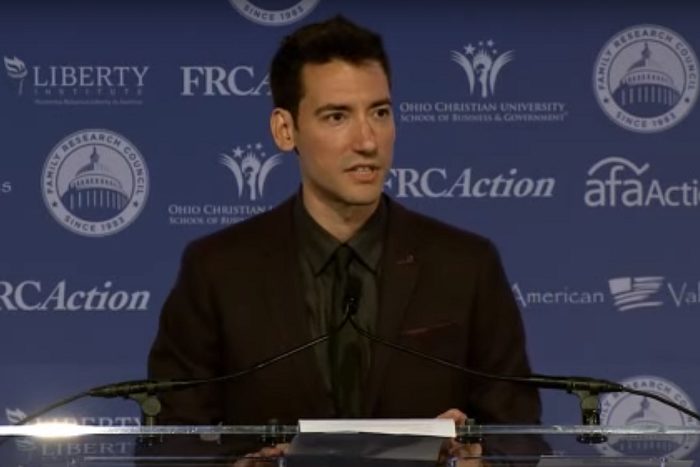More Bad Legal News for Group Attacking Planned Parenthood
A federal judge handed down a ruling largely in favor of the National Abortion Federation after a discovery hearing last week.

A federal judge last week handed the National Abortion Federation (NAF) a victory in the ongoing discovery battle between NAF and the Center for Medical Progress (CMP), the anti-choice front group behind the heavily edited Planned Parenthood attack videos.
In a five-page order, United States District Court Judge William Orrick said that CMP and the group’s leader, David Daleiden, must do more to comply with NAF’s discovery requests.
NAF filed a lawsuit in late July alleging civil conspiracy, racketeering, fraud, and breach of contract, among other civil and criminal allegations, stemming from the release of video footage deceptively edited to suggest that NAF members, including certain Planned Parenthood affiliates, are engaged in illegal trafficking of fetal body parts.
NAF also sought a temporary restraining order blocking any further release of the attack videos in order to protect its members from harassment and violent threats from anti-choice activists and domestic terrorists.
Orrick issued the temporary restraining order, and ordered expedited discovery so that NAF could gather evidence to support its effort to obtain a preliminary injunction blocking CMP and Daleiden from releasing additional footage or other materials that NAF alleges the anti-choice front group fraudulently acquired.
CMP has maintained that the temporary restraining order and any preliminary injunction that Orrick might issue constitutes prior restraint, or pre-publication censorship, and is a violation of CMP’s First Amendment right to freedom of speech.
While prior restraints on speech are almost always unconstitutional, many federal courts have held that First Amendment rights can be waived by contract, which is what NAF alleges CMP did when it signed the confidentiality agreements in order to gain access to NAF’s annual meetings.
CMP has stalwartly attempted to avoid providing responses to NAF’s requests for information. It appeared the anti-choice front group might be successful in stonewalling NAF’s discovery efforts. The Ninth Circuit granted CMP a temporary reprieve last month when it put a hold (known in legal parlance as a stay) on discovery following an emergency request by CMP, so that the court would have sufficient time to consider CMP’s emergency petition and NAF’s response.
That reprieve was brief, however. The Ninth Circuit ultimately dissolved the stay it had imposed, and agreed with Orrick that NAF is entitled to targeted discovery in its efforts to obtain a preliminary injunction, blocking CMP from releasing any further videos containing information NAF alleges CMP stole.
After CMP and NAF exchanged discovery responses this month, both parties submitted a joint letter to Orrick in which each side complained about the other’s responses.
CMP had failed to conduct an adequate search for responsive documents, according to NAF. Specifically, NAF argued that CMP must turn over the names and identities of the people involved in CMP’s smear campaign, including the names and identities of the CMP agents who infiltrated NAF’s annual meetings in 2014 and 2015 and made illicit recordings.
NAF also requested the names and identities of the recipients of a report that CMP distributed regarding its activities at one of NAF’s meetings. In the joint letter filed with the court, CMP admitted that “a year and a half ago, there was an extremely limited disclosure made in writing to an extremely limited number of people.” NAF wants to know who those people are.
Daleiden and CMP argued that providing the identities of those people, what they call a “membership list,” would be premature since the discovery at issue pertains only to the preliminary injunction. They claimed that providing a membership list would intrude on Daleiden’s right to associational privacy under the First Amendment, stating that “[t]he First Amendment provides strong protections to political activists who seek out like-minded individuals with which to brainstorm ideas for their activism.”
Daleiden and CMP argued that producing a membership list might jeopardize the Fifth Amendment rights of those people.
For its part, CMP and Daleiden complained that NAF had refused to provide any internal emails and communications that post-dated the release of the first videos. NAF balked at CMP’s request for all communications, since the communications generated after the release of the videos involved NAF’s general counsel and number in the thousands, and have nothing to do with whether the temporary restraining order issued in favor of NAF should be converted into a preliminary injunction.
Orrick handed down a ruling largely in favor of NAF after a discovery hearing last week.
Orrick said that NAF had raised “[s]ignificant questions” as to “the completeness, adequacy and clarity of CMP and Daleiden’s search for and responses to the requests for production,” and ordered CMP and Daleiden to provide supplemental responses to NAF’s discovery requests.
Orrick ruled that CMP was not entitled to any communications that post-date the disclosure of CMP’s project, but did not address whether NAF would have to produce those communications during full-blown merits discovery.
Orrick ordered the parties to file a joint brief addressing the constitutional issues raised by CMP and Daleiden—whether turning over the identities of CMP’s agents and co-conspirators implicate the First or Fifth amendments. That brief is due October 23, as are CMP and Daleiden’s supplemental responses.
